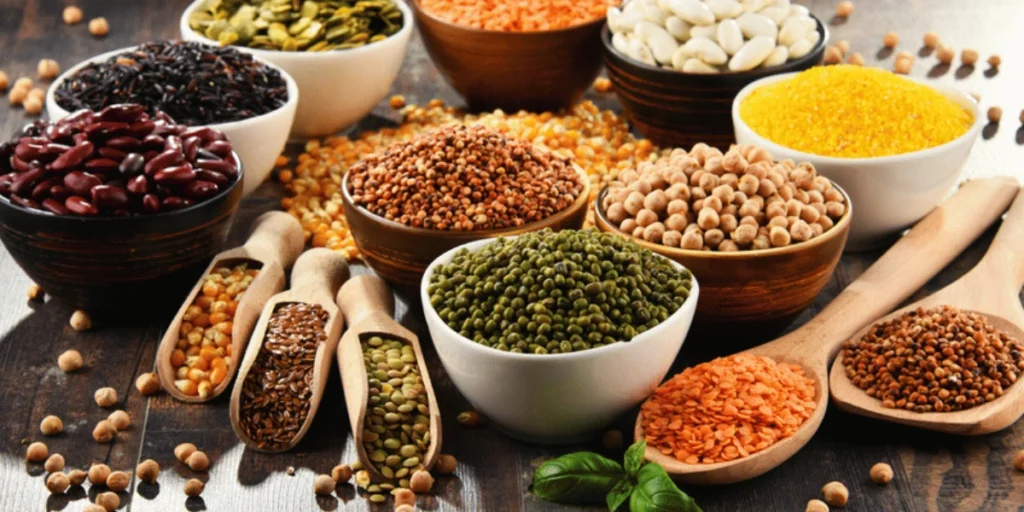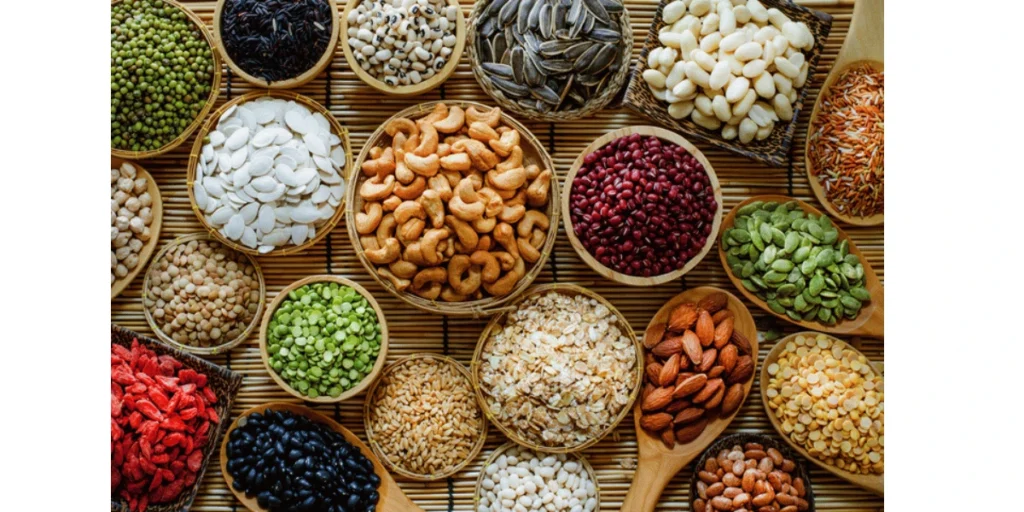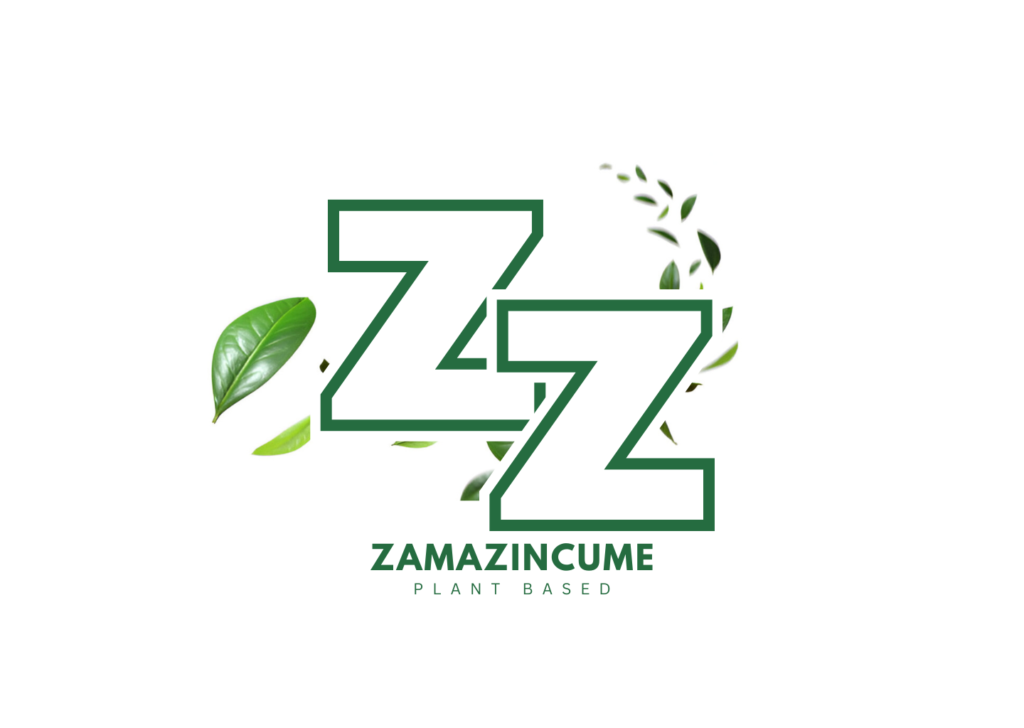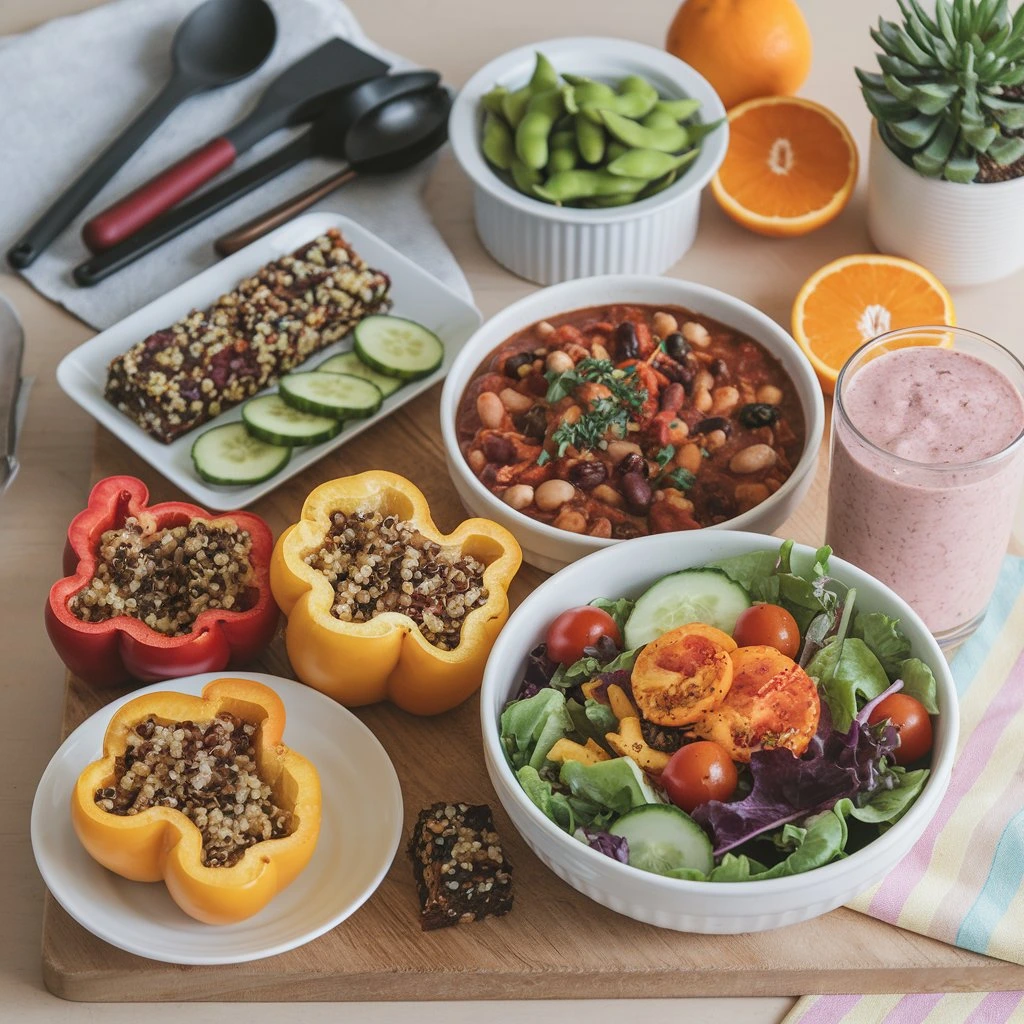Introduction to Plant-Based Protein
Here’s your comprehensive guide to understanding plant-based protein.
Ever noticed how more and more people are talking about ditching meat, even just a few days a week?
Well, you do not imagine things!
There’s a real buzz around plant-based protein these days, and for good reason.
What exactly is this plant-based protein trend all about?
Simply put, it’s about getting the essential building blocks your body needs, not from animals, but directly from plants.
This rising popularity isn’t just a trend. It shows a significant change in how we see our diets.
Ultimately, understanding plant-based protein is becoming increasingly vital.
Why, you ask?
It covers many essential parts of our lives. This includes our health, ethics, and the planet’s sustainability.
This overview highlights the fantastic benefits of plant-based protein. It also guides you through its exciting world.
So, let’s dive in and explore why these powerful proteins are making such a big difference!
What Exactly is Plant-Based Protein?
Demystifying Plant-Based Protein: Beyond Animal Sources
So, we’ve talked about the buzz around plant-based protein, but what does that mean? Plant-based protein comes from plants instead of animal products.
Think beans, lentils, nuts, seeds, and grains – these are your powerhouses!
For a long time, people thought meat, eggs, and dairy were the best protein sources. But now, we know there are many more options.
The Building Blocks: Amino Acids in Plant-Based Protein
Let’s get a little scientific without being overwhelming.
All proteins, whether from plants or animals, consist of smaller units called amino acids. Many body activities depend on these amino acids.
They help build muscles and produce enzymes. Plants offer a fantastic variety of these crucial building blocks!
Complete vs Incomplete Plant Proteins: Understanding Essential Amino Acids
You might have heard the terms “complete” and “incomplete” when discussing plant protein. Don’t let that confuse you!
A “complete protein” has all nine of the amino acids that your body needs. These are the amino acids our bodies cannot make by themselves. Many animal proteins are complete, but some plants are too. Quinoa, soy (like tofu, tempeh, and edamame), and hemp seeds are good examples.
But what about “incomplete” plant proteins?
They might be lower in one or two essential amino acids. The good news? You don’t need to get all nine in every single meal!
Combining plant proteins like rice and beans during the day helps meet your nutritional needs.
This flexible approach makes incorporating diverse plant protein sources both simple and delicious.
Key Differences Between Plant and Animal Protein
Beyond the amino acid profile, there are other notable distinctions.
Plant-based protein is rich in fibre, antioxidants, and many helpful micronutrients. Animal proteins usually don’t have these benefits.
Animal proteins have cholesterol and saturated fat, but plant proteins do not. You can make better choices about how much protein you eat if you know about these distinctions.
Top Plant-Based Protein Sources: A Detailed Exploration
Powerhouse Plant-Based Protein Sources for Optimal Health
When you think about adding more plant protein to your plate, a few categories shine. We’re discussing foods that are high in protein and loaded with other nutrients for your health.
Legumes: The Versatile Plant Protein Champions
First up, we have legumes!
These are the powerhouses of plant-based protein. They provide great versatility and nutrition.
Lentils: A Fibre and Protein Powerhouse
Whether you prefer red, green, or brown lentils, these tiny legumes are mighty! They’re cheap, cook quickly, and offer good plant protein and gut-friendly fibre. Think hearty lentil soups, stews, or even a simple lentil salad.
Beans: Diverse and Nutrient-Rich Plant Proteins
The bean family is vast and extraordinary. It includes black beans, kidney beans, chickpeas (or garbanzo beans), and cannellini beans. Each variety has unique flavours and textures. They are great for chilis, tacos, hummus, or roasted snacks. They’re brimming with protein and complex carbohydrates.
Edamame and Soy Products: Complete Plant-Based Protein Options
Soy is a star in plant protein. It’s one of the few complete plant-based proteins. This signifies that it has all nine of the essential amino acids. You have options like tofu, which works well in stir-fries and scrambles.
Tempeh is a soy food that has been fermented and tastes like nuts. It’s perfect for grilling or crumbling. Edamame is another choice. These tasty green pods make an ideal snack or salad topping.

Grains: Beyond Carbs to Quality Plant Protein
Many grains provide energy-boosting carbs and also offer great plant protein.
Quinoa: The Complete Protein Grain
This “ancient grain” (though technically a seed!) is a superstar for a reason. Quinoa is a complete plant protein. It’s great for meals, boosts salads, and can even be used in breakfast porridge.
Oats: A Hearty and Protein-Rich Breakfast Staple
Your morning oatmeal isn’t just for fibre! Oats contribute a good amount of plant protein, especially when paired with nuts or seeds.
Other Protein-Rich Grains
Consider other options like farro, bulgur, wild rice, amaranth, teff, and khorasan wheat (Kamut). These grains add variety, texture, and valuable protein to your diet.
Nuts and Seeds: Compact Plant Protein Powerhouses
Nuts and seeds may be small, but they’re powerful. They pack a lot of plant-based protein, healthy fats, and essential nutrients.
Hemp Seeds: A Complete Protein with Healthy Fats
These tiny seeds are a great source of complete plant protein. They also provide helpful omega-3s. Sprinkle them on everything!
Chia Seeds: Tiny but Mighty Plant-Based Protein and Fibre
Chia seeds are famous for their gelling ability. They also have a lot of plant protein and fibre.
Flaxseeds: Omega-3s and Protein Combined
Flaxseeds are often ground to help with absorption. They provide healthy fats and a good amount of plant protein.
Pumpkin Seeds and Sunflower Seeds: Nutrient-Dense Plant Protein
These easy-to-find seeds are great for snacks or salads. They add crunch and provide protein and minerals.
Almonds, Peanuts, and Other Nuts: Everyday Plant Protein sources
Nuts like almonds, peanuts, cashews, and walnuts are tasty and easy to grab. They also help boost your daily protein intake.
Nut Butters: Creamy and Convenient Plant Protein
You can obtain additional plant protein quickly by eating almond butter, cashew butter, or peanut butter. You can eat them with fruit, spread them on toast, or mix them into smoothies.

Vegetables: Surprising Sources of Plant-Based Protein
Vegetables might not pack as much protein as legumes or nuts, but they still contribute a decent amount of plant-based protein to your diet. Eating larger quantities can help boost your intake.
Green peas: A Sweet and Savoury Plant Protein Addition
These little green gems pack a surprising protein punch. They shine in stir-fries, pastas, or as a quick side.
Spinach and Other Leafy Greens: Contributing to Daily Plant Protein Intake
Spinach, kale, and other dark leafy greens are a good source of protein and a lot of vitamins and minerals.
Broccoli and Other Cruciferous Vegetables: More Than Just Fibre
Not only are broccoli, Brussels sprouts, and cauliflower fibrous. They also offer a nice amount of plant protein.
Novel and Emerging Plant Protein Sources
The world of plant-based protein is growing fast. New and exciting options keep popping up on the market.
Seitan: Wheat-Based Meat Alternative
Seitan is made from wheat gluten. It has a meaty texture and is high in protein. This makes it a popular meat alternative.

Nutrition Yeast: A Cheesy, Protein-Packed Flavour Enhancer
Nutritional yeast gives a “cheesy” flavour. It’s also packed with plant protein and B vitamins.
Mycoprotein (Quorn): A Fungi-Derived Protein
Mycoprotein comes from a fungus. Products like Quorn are gaining popularity as a sustainable and versatile protein source.
You can see that there are many tasty and healthy plant-based protein options for your diet!
Nutritional Benefits of Plant-Based Protein
Beyond Protein: The Holistic Health Advantages of Plant-Based Diets
One great thing about plant-based protein is that it offers more than just protein. You’re also bringing many other great nutrients that support your overall health. It’s a package deal, and frankly, a very impressive one!
High Fibre Content: Supporting Digestive Health and Satiety
First up, let’s talk fibre!
Unlike animal proteins, virtually all plant protein sources are rich in dietary fibre. This is great for digestion. It helps things move smoothly and keeps your gut microbiome happy. What’s more, fibre contributes significantly to satiety, meaning you feel fuller for longer.
This can change the game for managing weight. It helps you avoid those annoying snack cravings.
Rich in Vitamins and Minerals: Essential Micronutrients from Plant Proteins
Choosing plant-based protein means you’re also getting important essential micronutrients.
Lentils are full of iron and folate. Pumpkin seeds provide magnesium and zinc. Leafy greens add vitamins, like K, and some calcium.
These minerals and vitamins are essential for making energy and keeping bones healthy.
Antioxidant Power: Protecting Cells with Plant-Based Foods
A great perk of a plant-based diet is its strong antioxidant power.
Antioxidants keep free radicals from hurting your cells. These free radicals are linked to ageing and chronic diseases.
When you get protein from plants, you also protect your cells.
Heart Health Benefits: Lowering Cholesterol and Blood Pressure
Moving on, let’s talk about your ticker!
Research reveals that a diet rich in plant-based protein can greatly help heart health. Plant foods have no cholesterol. Hence, their fibre helps lower cholesterol levels.
Furthermore, Potassium in many plants helps control blood pressure. This can lower your chances of getting heart disease.
Weight Management and Satiety: How Plant Protein Helps
The fibre in plant protein helps with weight management. It does this by making you feel full.
Many plant protein sources have fewer calories and less saturated fat than animal sources. This makes it easier to keep a healthy weight without feeling deprived. It’s genuinely about feeling satisfied and nourished.
Reduced Risk of Chronic Diseases: Diabetes, Certain Cancers, and More
One fantastic advantage of choosing plant-based protein is that it minimises the risk of getting sick for a long time.
Eating a lot of plant protein and complete meals can lower the risk of type 2 diabetes and several malignancies, according to research.
It’s a robust preventive measure for long-term well-being.
Sustainability and Environmental Impact of Plant-Based Protein Production
Choosing plant-based protein is good for your health and good for the earth.
Plant-based protein needs much less land, water, and energy than animal farming. This makes the carbon footprint significantly smaller.
By choosing your food wisely, you invest in your health and a sustainable future for all.
It truly is a win-win!
How to Easily Incorporate Plant-Based Protein into Your Diet
Making the Switch: Practical Strategies for Boosting Plant-Based Protein
The key here is small, consistent steps. You don’t have to go fully vegan overnight (unless you want to!).
Adding just one or two plant-based protein meals each week can help.
Meal Planning for Plant-Based Protein Integration
One of the most effective practical strategies is to start with some basic meal planning.
Look at your week. Find some times when you can replace animal protein with a plant-based option.
Perhaps a “Meatless Monday” or a lentil soup for lunch on Tuesdays. This forethought makes integrating plant protein much easier.
Easy swaps: Replacing Animal Protein with Plant-Based Alternatives
Let’s talk about some quick wins. Love your morning scrambled eggs? Try a tofu scramble instead – it’s surprisingly versatile!
Instead of ground beef in your tacos, opt for seasoned black beans or lentils.
Craving chicken strips? Explore some of the excellent seitan or mushroom-based meat alternatives available.
These easy swaps are often barely noticeable once you get creative with seasoning.
Creative Cooking with Plant-Based Proteins: Recipes and Ideas
This is where the fun begins! Creative cooking with plant-based proteins opens up a world of delicious possibilities.
Breakfast Options
Start your day with a protein-rich smoothie. Use plant-based milk and add hemp seeds or nut butter. Or, have a big dish of porridge with chia seeds and berries on top. A tofu scramble with veggies is also a fantastic savoury choice.
Lunch Ideas
Pack a vibrant lentil soup or a refreshing bean salad for work. Quinoa bowls are incredibly versatile; add roasted veggies, chickpeas, and a tasty dressing.
Dinner Inspirations
Whip up a flavorful tempeh stir-fry with plenty of colourful vegetables.
Warming chickpea curry is always a hit. You can also try homemade lentil burgers on whole-grain buns.
Snack Solutions
For those in-between moments, grab a handful of nuts or seeds. You can also enjoy a small bowl of edamame or crunchy roasted chickpeas.
Tips for Enhancing Flavour and Texture in Plant-Based Dishes
Sometimes people worry about the taste or texture of plant-based foods. A key tip is to focus on bold flavours. Use herbs, spices, citrus zest, and vinegars generously.
Roasting and grilling can create great textures and rich flavours in vegetables and plant proteins, such as Tofu and tempeh.
Don’t be shy with marinades!
Fortified Plant-Based Products: Milks, Yoghurts, Cheeses
Finally, keep an eye out for fortified plant-based products.
Calcium and vitamin B12 are added to several plant-based milks, like almond and soy milk. This makes them great options. You’ll find more plant-based yoghurts and cheeses. They help you increase your daily protein.
Plus, you can enjoy familiar foods with a plant-based twist. It’s about exploring and finding what you love!
Addressing Common Concerns About Plant-Based Protein
It’s amazing how much misinformation can float around. We aim to help you with common questions and clear up myths about plant-based protein.
Getting Enough Protein Every Day on a Plant-Based Diet: Is it Enough?
Perhaps the biggest question people have is, “Can I get enough protein from plants?” The resounding answer is: absolutely, yes!
With thoughtful preparation and a variety of plant-based protein sources, you can get enough protein every day. This applies to adults, athletes, and growing children.
Consider all the strong plant-eating animals in nature. They get their protein entirely from plants!
Bioavailability of Plant Protein: Maximising Nutrient Absorption
Another concern is the bioavailability of plant protein. This refers to how well your body absorbs the nutrients.
Some plant proteins may be less bioavailable than animal proteins. However, you can easily fix this by eating a varied diet.
Soaking, sprouting, and fermenting legumes and grains can help absorb more nutrients.
Concerns About Soy: Is it Safe and Healthy?
Tofu, tempeh, and edamame are all soy products that are excellent sources of complete plant protein. However, they often raise questions.
Is soy safe and healthy?
Most scientists agree that eating moderate amounts of whole, unprocessed soy foods is safe. It can also be very beneficial. These foods may help protect against some chronic diseases. So, you can enjoy your soy with confidence!
Addressing Potential Nutrient Deficiencies (e.g., Vitamin B12, Iron, Omega-3s)
A well-planned plant-based diet is very nutritious. However, some nutrients need extra attention.
Vitamin B12 mainly comes from animal products.
If you follow a strict plant-based diet, it’s a good idea to take a B12 supplement.
For iron, include foods rich in iron, like lentils and spinach. Also, pair them with Vitamin C to help your body absorb the iron better.
As for Omega-3s, chia seeds, flaxseeds, and walnuts are excellent plant sources. Awareness is key here, not worry!
The Role of Supplements in Plant-Based Diets (if needed)
Whole foods should be your primary source of plant-based protein and nutrients. But supplements can help if necessary.
Some people may want a Vitamin D supplement, especially if they get a little sun.
Always talk to a doctor or a registered nutritionist. They can help you assess your needs and decide if supplements are right for you.
Building a strong, diverse plant-based diet is your best choice for great nutrition.
Plant-Based Protein for Specific Lifestyles
The beauty of plant-based eating is its flexibility.
You can customise your plant-based protein intake to fit your needs and goals.
Plant-based Protein for Athletes and Active Individuals
If you love sports or stay active, you should know about plant-based protein. It’s excellent for building muscle and helping with recovery.
The good news is, many plant-based athletes are thriving!
Most of the time, active persons need more protein, which is usually between 1.2 and 2.0 grams per kilogram of body weight. In intense training, this can be even higher. But you can easily meet these needs with plant-based sources.
Choose protein-rich foods such as tofu, tempeh, seitan, lentils, and protein powders from peas or rice.
Mixing various plant proteins during the day helps you get all the essential amino acids.
Plant-Based Protein for Weight Loss and Muscle Gain
Plant-based protein is a great friend for people who want to lose weight or increase muscle.
Its high fibre content helps you feel full. This means you can eat fewer calories.
Also, getting enough protein is key. It helps you keep your muscle mass while you lose weight. Plus, it supports building new muscle when trying to gain. Sources like legumes, soy products, and nuts are excellent for supporting these goals.
Plant-Based Protein for Children and Adolescents
“But what about the kids?” is a common question.
Don’t worry. Plant-based protein is excellent for kids and teens. It helps them grow and develop healthily. The objective is to provide people a lot of different plant foods that are high in nutrients.
Consider lentils, beans, and tofu. Tofu is popular for its mild taste and versatility.
Go for fortified plant milks, especially soy milk. It’s similar to dairy in nutrition. Don’t forget nuts and seeds!
Parents can easily incorporate these into kid-friendly meals and snacks.
Plant-Based Proteins for Older Adults
Finally, as we age, maintaining muscle mass and health becomes even more critical. Plant-based protein for older adults is incredibly beneficial.
Plant-based protein may be better for healthy ageing than animal protein. It can lower the chance of getting long-term ailments and make your brain healthier.
Pureed beans, smooth nut butter, and soft tofu are great for seniors. They provide the vital protein needed to stay strong and vibrant.
Conclusion
As we wrap up, it’s clear that understanding and embracing plant-based protein isn’t just a trend; it truly represents the future of food.
It’s a pathway towards a sustainable and healthy way of living that benefits both you and the planet.
Plant protein is rich in fibre, vitamins, and antioxidants. These vitamins and minerals are good for your heart, help you control your weight, and lower your risk of getting chronic diseases.
You can boost your plant-based protein intake in many ways. There are versatile legumes, grains, nuts, and seeds. The options are truly endless!
By choosing wisely and adding a mix of plant-based foods to your diet, you start a journey of change.
Explore, experiment, and enjoy the amazing benefits of plant-based protein.
Your body and the planet will appreciate it!
Frequently Asked Questions (FAQs) About Plant-Based Protein
Can plant-based sources provide enough protein?
Absolutely! A balanced diet can give everyone enough protein from plants. This works for all ages and activity levels. It’s all about including diverse legumes, grains, nuts, and seeds.
What are the best plant-based protein sources?
Some excellent plant-based protein sources include lentils, black beans, chickpeas, tofu, tempeh, quinoa, hemp seeds, and a variety of nuts and seeds. They pack essential nutrients.
Is soy safe to consume as a plant-based protein
Yes, generally!
Experts agree that eating whole, unprocessed soy foods like tofu and tempeh is safe. Plus, they provide many health benefits as a plant-based protein choice.
How can I make sure I get all the important amino acids I need on a plant-based diet?
It’s simpler than you think! Eating different plant proteins during the day gives you all the essential amino acids. You don’t need to combine them in every single meal perfectly; your body is smart and stores them.
Do plant-based proteins help with weight loss?
Definitely! Many plant-based proteins are rich in fibre, which helps you feel fuller for longer. This added fullness could help you eat fewer calories. So, it supports your weight loss goals.



2 Responses